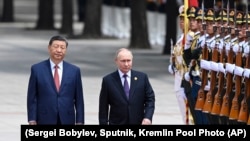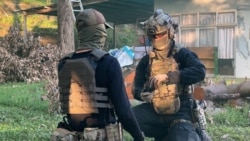Chinese leader Xi Jinping is holding a massive military parade to mark 80 years since the end of World War II, but the event is not only about the past, it's part of a broader push to reshape its future role on the global political stage.
At the September 3 parade, Xi is expected to be flanked by Russian President Vladimir Putin, North Korean leader Kim Jong Un, and more than 24 other heads of state and government ranging from Belarus to Iran.
Once in motion, the parade is seen as a display of military and diplomatic strength by Beijing to showcase its latest military hardware and flaunt its status as a global leader capable of rivaling the United States.
But analysts say that China also sees the Victory Day parade as part of a more long-term goal to amplify its role in World War II and recast itself as the guardian of the post war international order.
"China is trying to use the parade to promote its version of history and how that aligns with the type of world it wants to create today where it's a leading power," Scott Kennedy, a longtime China expert who is a senior adviser and trustee chair at the Center for Strategic and International Studies (CSIS) think tank in Washington, told RFE/RL.
Central to that Chinese narrative around World War II -- which the country marks as ending with imperial Japan's surrender in 1945 -- is reinforcing Beijing's sovereignty claims over Taiwan, the self-governing island whose complicated international status is wrapped up in a series of post-war treaties and a grueling civil war that saw China's communists emerge victorious over the nationalist forces, who fled to Taiwan in 1949. Beijing has since vowed to unify with the island and has not ruled out the use of force to do so.
"China's military aims are primarily regional, with dominating the Asia-Pacific and controlling Taiwan at the top," said Kennedy. "China is looking to have an audience of world leaders at the parade to validate these foreign policy goals."
'To Have A Future, Russia And China Need To Have A Past'
A key partner in that pursuit for Beijing is Putin, who has already challenged the international system with Russia's invasion of Georgia in 2008, forceful annexation of Crimea in 2014, and full-scale invasion of Ukraine in 2022.
Putin has been in China since August 31, when he arrived for another choreographed diplomatic display, the Shanghai Cooperation Organization (SCO) summit, which wrapped up this week. At the summit, Beijing also convened an array of leading non-Western leaders to endorse its reinterpretation of the global order as it looked to contrast its emphasis on multilateralism with the more transactional foreign policy coming from the United States.
Speaking to world leaders at the summit in northern China, Xi called on countries to promote what he deemed the "correct" perspective of World War II and to support multilateralism.
"China and the Soviet Union were the principal theatres of that war in Asia and Europe respectively," Xi wrote in May ahead of a visit to Moscow where he watched Russia's own Victory Day parade marking the defeat of Nazi Germany.
"The two countries served as the mainstay of resistance against Japanese militarism and German Nazism, making pivotal contributions to the victory of the World Anti-Fascist War," Xi said.
Together with Russia, China is looking to play down the US contribution -- and frame itself as the central force of resistance against Japan. China dates its "war of resistance against Japanese aggression" to 1931 –- a decade before the United States entered the fighting.
"It's a major reframing of world history to position Russia and China as the two forces against fascism," Claus Soong, an analyst at the Berlin-based think tank MERICS, told RFE/RL. "To have a future, Russia and China need to have a past."
The EU Keeps Its Distance From Xi's Military Parade
The presence of Putin at the parade, as well as its focus on Japan –- a key Western ally – has led European envoys in Beijing to downscale their participation and attendance at the high-profile event, with European Union diplomats telling RFE/RL that no officials will attend the parade.
"We are boycotting the parade because Russia is participating, but not the events around it," a senior EU diplomat, who requested anonymity to speak freely to the media, told RFE/RL.
In addition to the complications around Japan and Putin's attendance, EU officials have also voiced criticism over Beijing's support for Russia's war against Ukraine, where China has helped Moscow's war effort with a steady flow of militarily useful dual-use goods.
No Western leaders will be among the foreign heads of state and government attending the parade with the exception of Slovak Prime Minister Robert Fico. Serbian President Aleksandar Vucic, whose country has applied to join the EU, will also attend the event.
"It's good that this is happening all out in the open, no one can say that China is somehow closer to us," another EU diplomat told RFE/RL.
"It's sad that Serbia, an EU candidate country, is there, but again, not a surprise. They say one thing about EU alignment, but do another," the diplomat continued.
What Is China's Narrative Around Taiwan And World War II?
In Xi's last World War II anniversary speech in 2015, which was also marked with a parade, he did not mention Taiwan as it came at a time of improving relations between Beijing and Taipei.
But Taiwan is expected to be a central pillar of Xi's speech this year. Since 2015, Beijing has become more aggressive toward Taiwan, and its propaganda has routinely sought to frame Taiwanese President Lai Ching-te as a dangerous separatist.
Taiwan's status continues to complicate the narrative that Xi is looking to recast around World War II.
While communist forces fought against Japan's full-scale invasion of China, a lot of the fighting was done by the troops from the nationalist government, known as the Republic of China, who later fled to Taiwan after losing the civil war.
The government of the Republic of China, the official name still used by Taiwan, led the post-war negotiations. It was also the Republic of China that signed the peace agreement as one of the allied nations and was still in power in 1945 when Taiwan was handed over after decades of Japanese rule.
The Chinese Communist Party-run People's Republic of China wasn't founded until 1949 and has not controlled the island of Taiwan.
Still, Beijing says the World War II victory belongs to all Chinese people, including those in Taiwan, and interprets the peace agreements as leading to Taiwan being "returned" to Chinese rule.
But as Soong says, the parade and Xi's efforts to change the narrative of the war are mainly aimed at a domestic audience and at countries in the Global South.
"The Chinese Communist Party is trying to create a common bond," he said. "We'll see during Xi's speech how China is trying to shape history."















